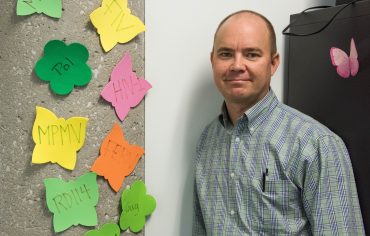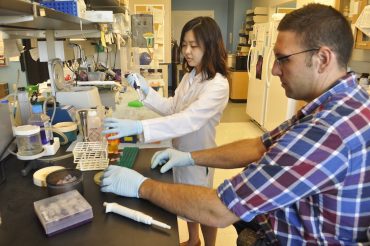AIDS

Nov. 25, 2015
You shall not pass: the basic science of blocking HIV
Marc Johnson, associate professor of molecular microbiology and immunology at the Bond Life Sciences Center, studies viruses such as HIV. | photo by Jennifer Lu, Bond LSC Nineteen colorful foam flowers decorate the walls of Marc Johnson’s office, a memento from his lab members when they “redecorated” while he was out of town. Each flower is labeled in bold Sharpie with the names of viruses and viral proteins that his lab studies—MLV, RSV, Gag, Pol, to name a few. One flower stands out, marked in capital letters: H-I-V. Johnson, an associate professor of molecular microbiology…

Aug. 4, 2014
Viruses as Vehicles: Finding what drives
Graduate students Yuleam Song and Dan Salamango inoculate a bacteria culture in Johnson’s lab. The inoculation takes a small portion of a virus and multiplies the sample, allowing researchers to custom-make viruses. By Madison Knapp | Bond Life Sciences Center summer intern Modern science has found a way to turn viruses —tiny, dangerous weapons responsible for runny noses, crippling stomach pains and worldwide epidemics such as AIDS— into a tool. Gene therapy centers on the idea that scientists can hijack viruses and use them as vehicles to deliver DNA to organs in the body that…